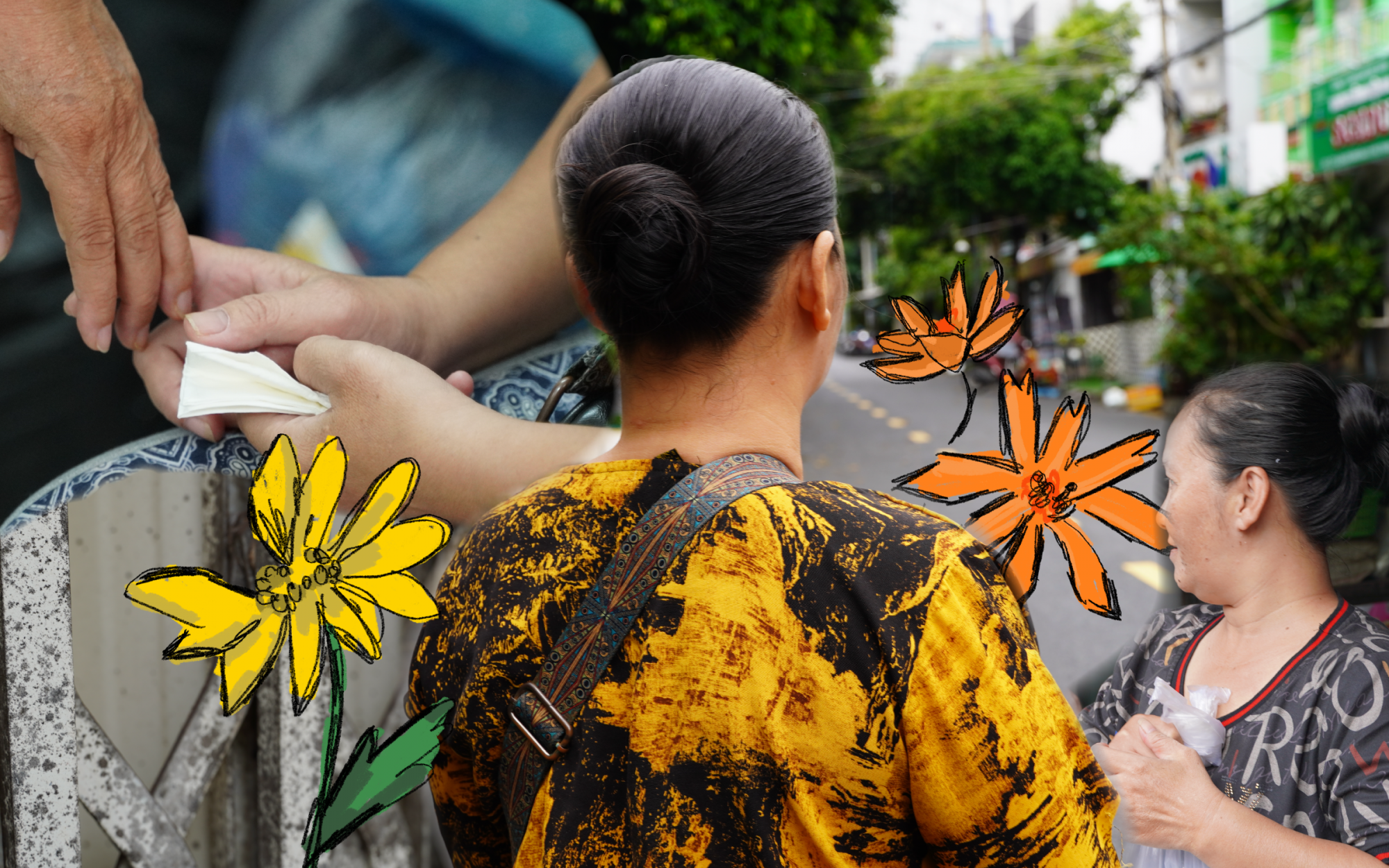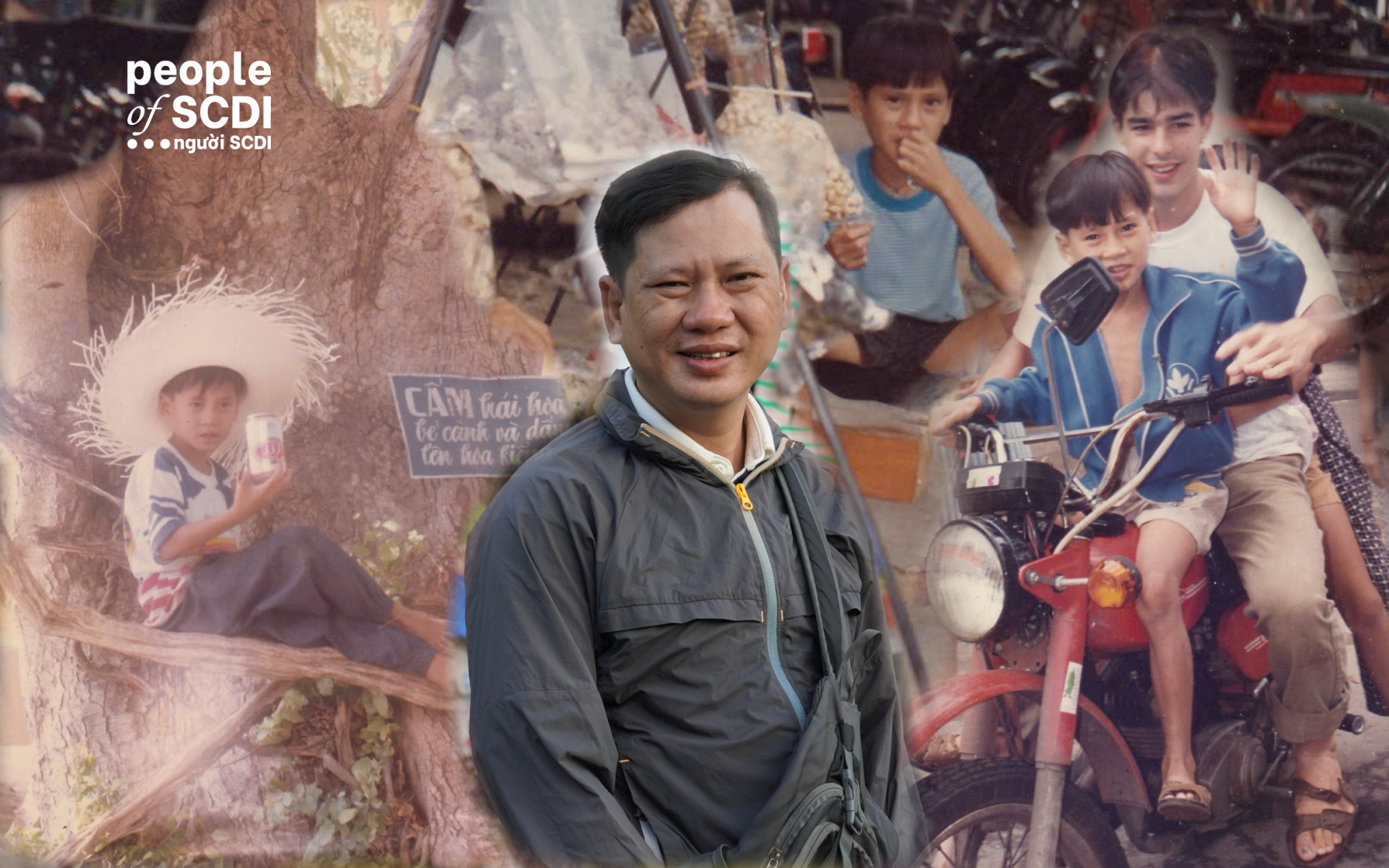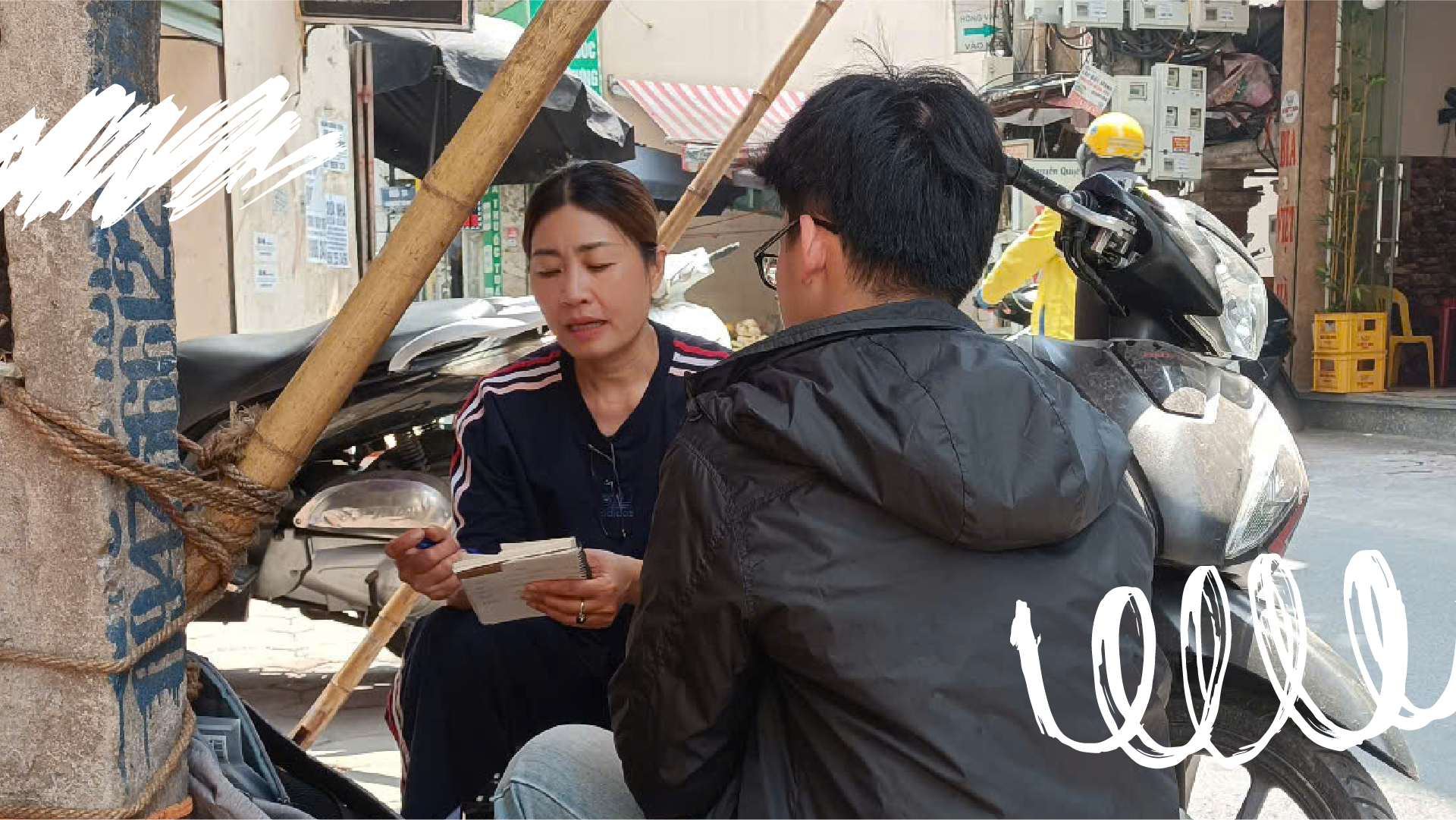Journey of Learning Self-Loving
Mental health and adverse childhood experiences may not be unfamiliar concepts. But to put it in relation to drug use among adolescents and young people aged 16-24, could you imagine?
If we patiently look deeply into the stories of young people in their twenties using substances and setting aside negative thoughts and discrimination, perhaps we will see somewhere the childhood sadness, the hesitation of youth, the fragments of love, or the burden of making a living. What will that pain be like when all those people experience in life are prejudices and being turned away, and because of substance use, their life is considered over?
If we patiently look deeply into the stories of young people in their twenties using substances and setting aside negative thoughts and discrimination, perhaps we will see somewhere the childhood sadness, the hesitation of youth, the fragments of love, or the burden of making a living. What will that pain be like when all those people experience in life are prejudices and being turned away, and because of substance use, their life is considered over?

The stories can only be shared when we listen with sincerity and without judgment
Melancholy
I have no idea about my father. My mother only really appeared in my life when I was five years old after she got out of jail. I never went to school, so I have no friends. My mother, two brothers, and one sister are the only relationships around me. But none of them need me.
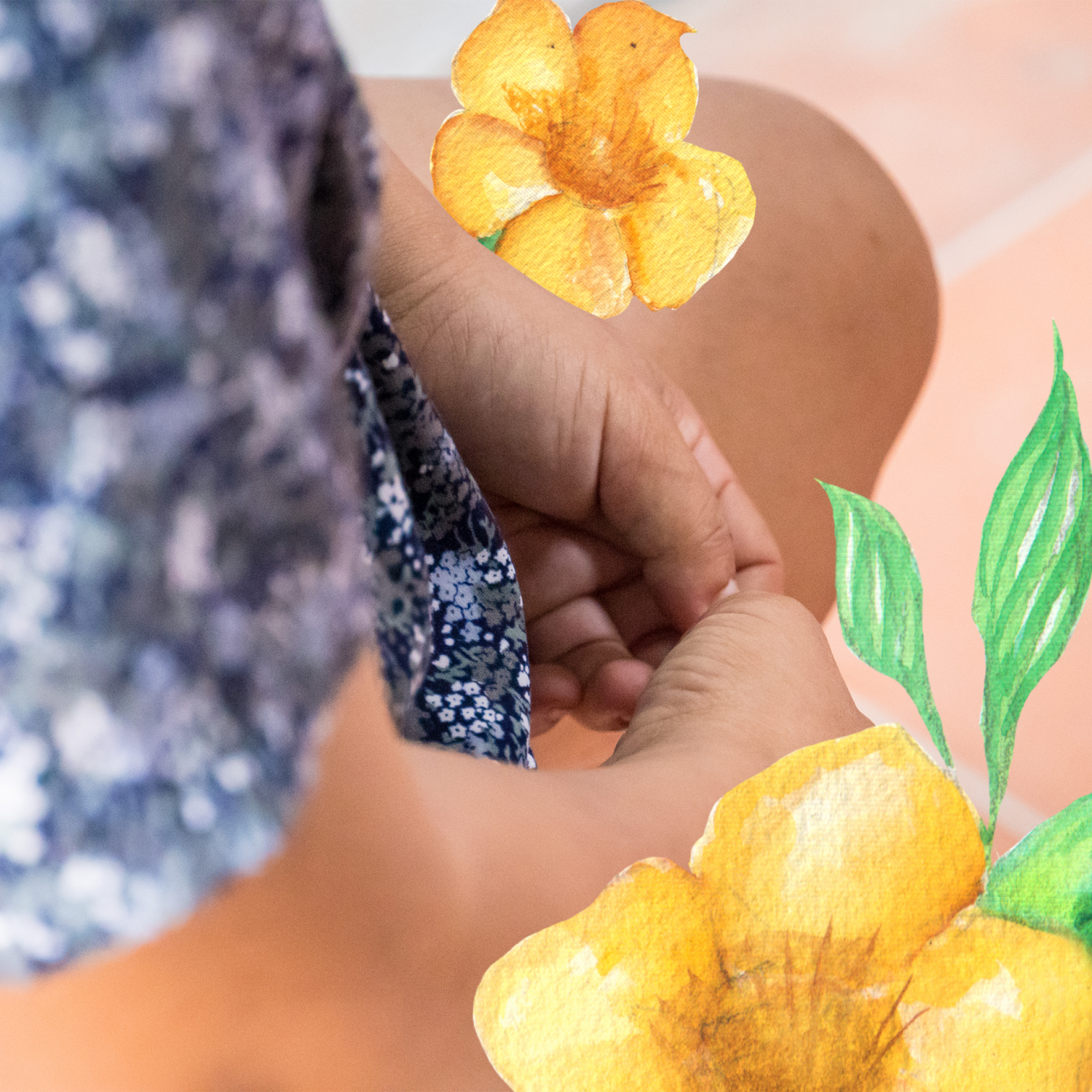
"Sometimes I wonder why I was born into this world"
My siblings and I lacked parental figures in our childhood. The four children squinted like weeds growing against each other. Many things happened between us during that time without guidance, without anyone caring or teaching. The terrifying memories are always vivid in my mind, no matter how much time has passed. A child like me longs for my mother's protection.
But even since she returned, the lack inside me has not filled. I feel my mother doesn't love me. I told my mother what happened while she was away, but she only asked me to keep it a secret, or else it would embarrass the family. It is not a word of comfort, defence, or justice for me, even within the family. My mother always tolerated my brothers and sisters. The wrong one is always me. Am I not my mother's child? Why does mom treat me like that?
I hate my mother. I did things that made my mother angry. I turned to drugs, relying on the short-lived feelings of ecstasy it brought to forget reality. I had sex with clients right at home, partly to get revenge on my mother and partly to earn money and leave that place as quickly and far as possible. And she was furious. She nagged and criticised me more. She said, "If only I didn't have a child like you." .
But even since she returned, the lack inside me has not filled. I feel my mother doesn't love me. I told my mother what happened while she was away, but she only asked me to keep it a secret, or else it would embarrass the family. It is not a word of comfort, defence, or justice for me, even within the family. My mother always tolerated my brothers and sisters. The wrong one is always me. Am I not my mother's child? Why does mom treat me like that?
I hate my mother. I did things that made my mother angry. I turned to drugs, relying on the short-lived feelings of ecstasy it brought to forget reality. I had sex with clients right at home, partly to get revenge on my mother and partly to earn money and leave that place as quickly and far as possible. And she was furious. She nagged and criticised me more. She said, "If only I didn't have a child like you." .
In family battles, no one wins. Instead of boasting, I went deeper and deeper into a dead end
Being able to earn money, I immediately moved out of the house. Even though I fulfilled my desire to leave my mother, I did not feel happy. On the contrary, relying on substance use has made me even more dependent, drawn deeper into a vicious cycle where the pain is still present. I continue to work as a sex worker to maintain an independent life. The thought of winning or losing and having nothing to lose has made me not have any motivation to protect myself. My life goes by in such a crazy way.
Trapped
My parents have seven children, and I am the fourth child. My father sells lottery tickets during the day. My mother works as a construction helper. When there's no work, my mother also sells lottery tickets. My father has a nervous neurologic disease; when he takes his medicine, he's conscious; when he doesn't, the disease relapses. My brother also has the same illness as my father. But there’s no problem with me. Because my family is poor, I also started working early to support my parents.
The first time I used drugs was when I was 13 years old. Back then, I didn't know what drugs were. My friends invited me, so I joined in for fun, and then I couldn't stop. The first time I used it, I was feeling full of energy.
The first time I used drugs was when I was 13 years old. Back then, I didn't know what drugs were. My friends invited me, so I joined in for fun, and then I couldn't stop. The first time I used it, I was feeling full of energy.

I started working early to support my parents. The first time I used drugs, I didn't know what it was. My friends invited me, so I joined in for fun, and then I couldn't stop.
I hid from my family the fact that I was using drugs. For four to five years, no one noticed at all. Until I was caught and had to serve 15 months. That's when everyone in the family found out.
After coming back, I noticed the change in people around me. The neighbours, even old close relatives and cousins, didn't dare to talk to me. There was a period of time when I worked too much and lost weight, and they said this and that, "Yeah, he's back to it again." I explained, but they didn't believe me. Sometimes, I felt so frustrated that I wanted to give up everything, but then I thought about my family.
After coming back, I noticed the change in people around me. The neighbours, even old close relatives and cousins, didn't dare to talk to me. There was a period of time when I worked too much and lost weight, and they said this and that, "Yeah, he's back to it again." I explained, but they didn't believe me. Sometimes, I felt so frustrated that I wanted to give up everything, but then I thought about my family.
Lonely and lost
I threw myself into the world at 14, taking care of myself and my family. I found it challenging to connect with my family from childhood to adulthood. I always felt that my parents lived with me only because of the money I earned. If there was money, everything was fine; without money, they would ignore and become distant. I didn't receive affection like my siblings. Sometimes, I even thought I wasn't their real child, as they always emphasized money and money.
I first used drugs when I was 15. In society, I faced all kinds of pressure and family problems, and being young and naive, I got pulled into using those substances. At first, I didn't think much about it; the feeling of forgetting everything when using was relieving. Then, I started seeking that temporary high without realizing it. At the same time, I moved out to live with my boyfriend. Both my boyfriend and I were using it. We stayed in a small, rundown shack, but it was much better than living with my parents. I felt like I had my own family.
Then came the day when I got pregnant. Life became much more challenging.
I first used drugs when I was 15. In society, I faced all kinds of pressure and family problems, and being young and naive, I got pulled into using those substances. At first, I didn't think much about it; the feeling of forgetting everything when using was relieving. Then, I started seeking that temporary high without realizing it. At the same time, I moved out to live with my boyfriend. Both my boyfriend and I were using it. We stayed in a small, rundown shack, but it was much better than living with my parents. I felt like I had my own family.
Then came the day when I got pregnant. Life became much more challenging.
Adverse Childhood Experiences and mental health are closely linked to drug use in young people

During implementation, Saving the Future has observed that adverse childhood experiences are one of the profound factors leading to drug use among adolescents. For those who have negative childhood experiences, the likelihood of drug use in adulthood is higher compared to those who do not. Drugs sometimes become the only and most convenient way they know to meet their social interaction needs, as well as to numb their inner pain. Drug use or substance abuse is sometimes a way to seek comfort, avoid, and even attempt to connect with oneself.
Common psychological characteristics of young people who use drugs involve many risky behaviours, suffering one or more psychological traumas, feelings of loneliness, and difficulty communicating with family and society.
According to research on nearly 600 drug-using teenagers aged 16 - 24 in Hanoi, Hai Phong, and Ho Chi Minh City conducted by the Saving the Future project, up to 43% of participants reported signs of moderate to severe depression.
Mental health disorders can appear before (as a cause) or after (as a consequence) of drug use and abuse. Treatment for mental health disorders and addiction treatment are not the same because they are two different diseases. If only one is treated, the recovery result will be lower than if both are treated concurrently.
The brain continues to develop until 24-25 years old. If, during that process, young people use stimulants that affect the central nervous system, such as drugs and alcohol, they will affect the brain development process, leading to the risk of developing mental health issues and a higher risk of addiction.
According to the sharing of Dr Nguyen Song Chi Trung – lecturer at the Psychiatry University of Medicine and Pharmacy in Ho Chi Minh City and lecturer at the Technology Transfer Center for Substance Use and HIV treatment, also collaboration with Saving the Future in screening and treatment for young people using drug with mental health disorder “In my interactions with young people through Saving the Future project, I've noticed a commonality among them. They face complex issues related to family circumstances, living conditions, or the nature of their work, which impact substance use problems not only due to one but many factors.
Common psychological characteristics of young people who use drugs involve many risky behaviours, suffering one or more psychological traumas, feelings of loneliness, and difficulty communicating with family and society.
According to research on nearly 600 drug-using teenagers aged 16 - 24 in Hanoi, Hai Phong, and Ho Chi Minh City conducted by the Saving the Future project, up to 43% of participants reported signs of moderate to severe depression.
Mental health disorders can appear before (as a cause) or after (as a consequence) of drug use and abuse. Treatment for mental health disorders and addiction treatment are not the same because they are two different diseases. If only one is treated, the recovery result will be lower than if both are treated concurrently.
The brain continues to develop until 24-25 years old. If, during that process, young people use stimulants that affect the central nervous system, such as drugs and alcohol, they will affect the brain development process, leading to the risk of developing mental health issues and a higher risk of addiction.
According to the sharing of Dr Nguyen Song Chi Trung – lecturer at the Psychiatry University of Medicine and Pharmacy in Ho Chi Minh City and lecturer at the Technology Transfer Center for Substance Use and HIV treatment, also collaboration with Saving the Future in screening and treatment for young people using drug with mental health disorder “In my interactions with young people through Saving the Future project, I've noticed a commonality among them. They face complex issues related to family circumstances, living conditions, or the nature of their work, which impact substance use problems not only due to one but many factors.
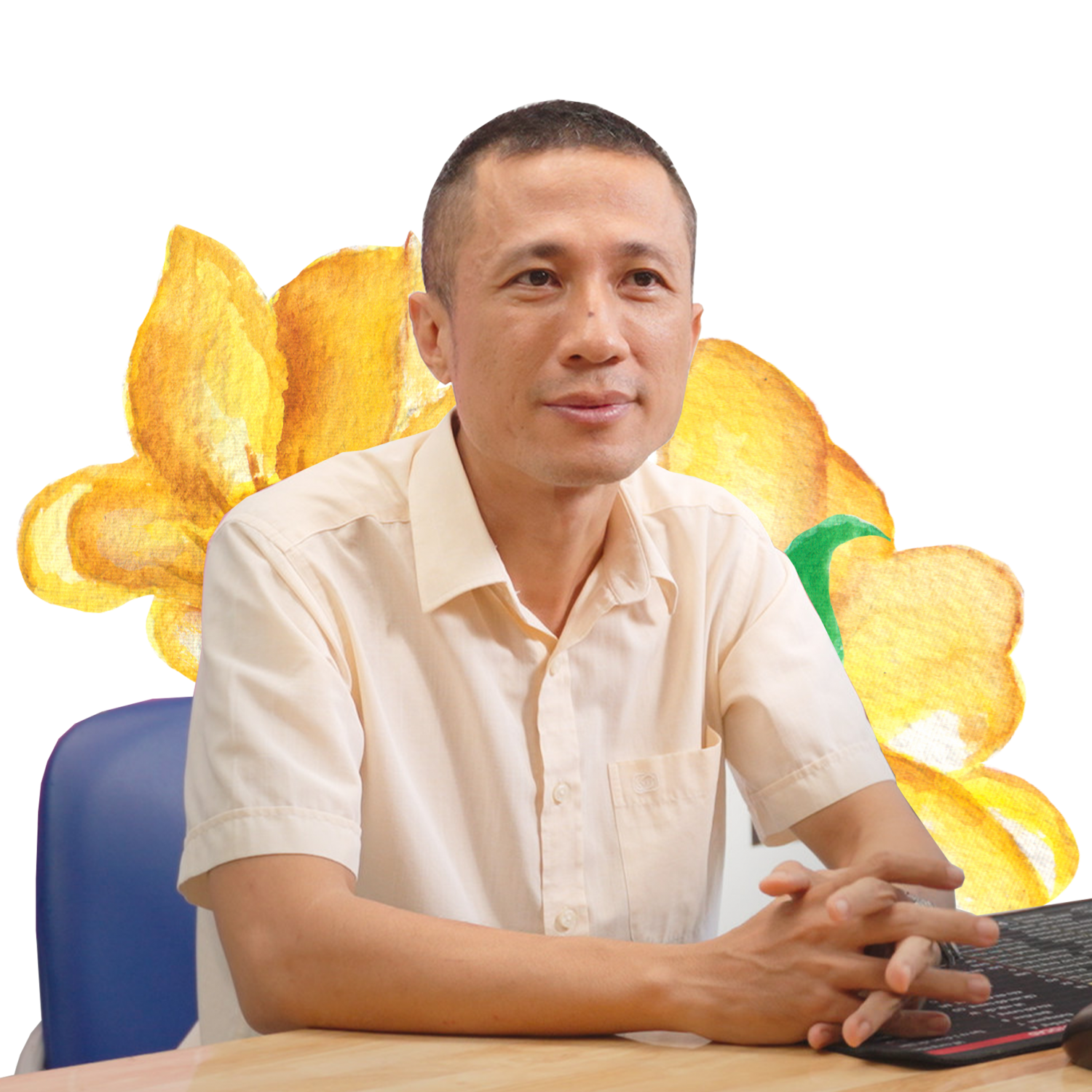
Dr. Nguyen Song Chi Trung "To change behaviour and mindset, multiple factors are necessary, not just medical but also familial and societal"
"From personal experience, I've encountered many individuals facing mental health issues related to substance use. The stigma and discrimination in society towards them are significant. However, if we genuinely seek to understand, open our hearts, and listen, we'll find that some genuinely strive to rise above their challenges rather than give up. Every time I conduct a consultation, every story teaches me something new."
I earnestly hope for a more compassionate and inclusive community perspective so that young people struggling with substance use can contribute positively to their lives.
Soothing the Childhood Sorrows
Based on the relationship and multidimensional impact between psychological factors and risk behaviours, the Saving the Future project builds a foundation for comprehensive interventions: addressing direct factors in the present and assessing and intervening for underlying risks such as mental health issues and adverse childhood experiences of the clients.Regarding mental health, the project implements interventions at two levels. At the community level, it provides guidance and transfers knowledge of problem identification and primary intervention to outreach workers. After that, the outreach workers refer the clients for examination/treatment to medical facilities with supervision and support from psychiatrists.
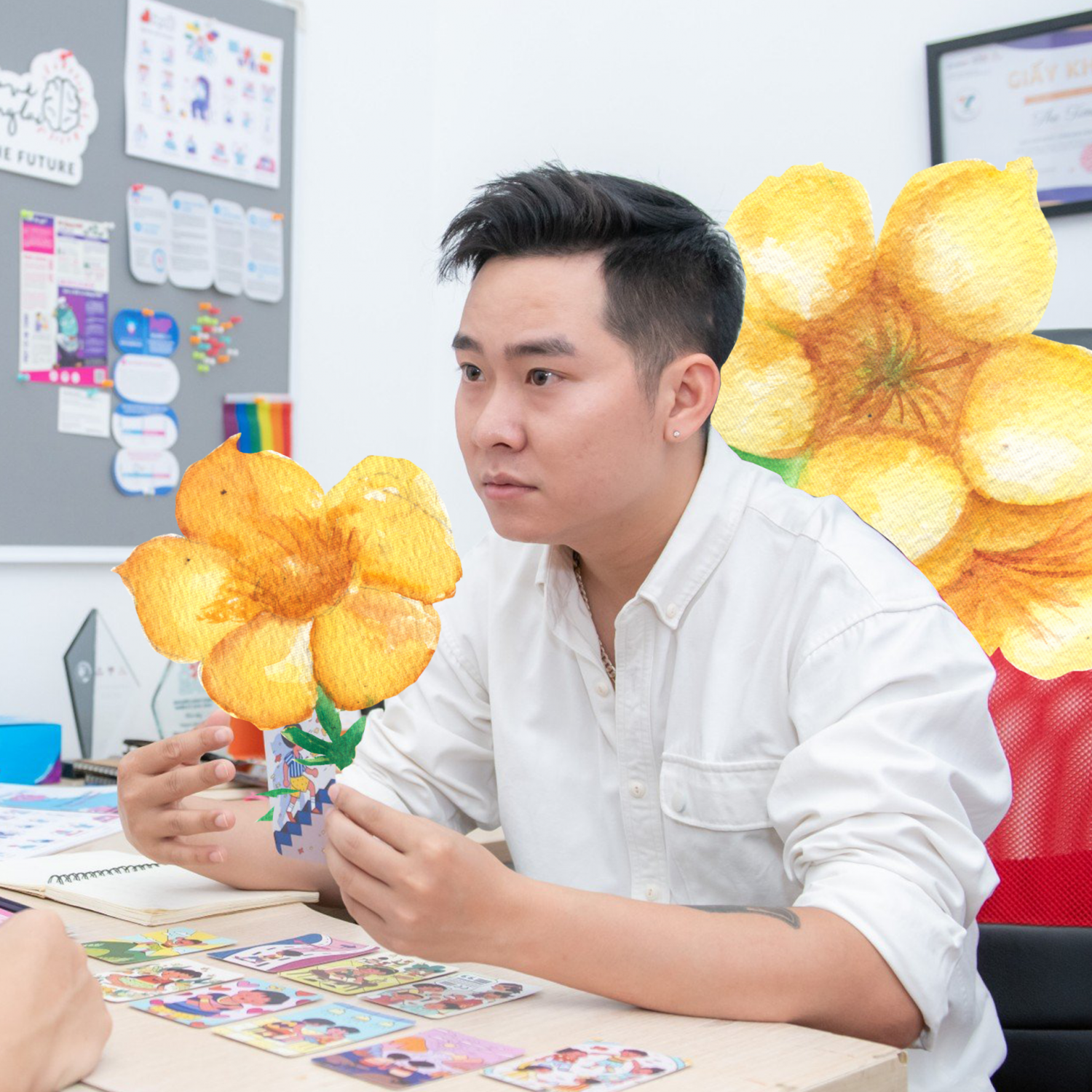
The project outreach workers are the first point of connection, providing consultation, screening, and sending clients for examination/treatment at medical facilities under the supervision of psychiatrists.


Regarding minimising the harmful effects of adverse childhood experiences, the Saving the Future project implements Art and Play Therapy and Mindfulness Healing Circle activities.
"For those who have negative childhood experiences, the likelihood of drug use in adulthood is higher compared to those who do not. Based on this correlation, in addition to addressing issues of substance use and HIV transmission, the project also aims to address the deep-rooted issues of substance use, namely negative childhood experiences. That's why in the Future Protection project, there are additional measures to mitigate the impact of negative childhood experiences: Therapeutic Play and Art Therapy activities and Mindfulness Healing Circle activities," shared Ms Vu Thi Hien, the project coordinator of the Future Protection project.
The outstanding advantage of these therapeutic forms is the ability to indirectly access the innermost thoughts of young people through joyful and gentle actions of play or artistic practice, thereby helping them reduce the harm of drug use, improve lifestyle habits, and protect their future.
"For those who have negative childhood experiences, the likelihood of drug use in adulthood is higher compared to those who do not. Based on this correlation, in addition to addressing issues of substance use and HIV transmission, the project also aims to address the deep-rooted issues of substance use, namely negative childhood experiences. That's why in the Future Protection project, there are additional measures to mitigate the impact of negative childhood experiences: Therapeutic Play and Art Therapy activities and Mindfulness Healing Circle activities," shared Ms Vu Thi Hien, the project coordinator of the Future Protection project.
The outstanding advantage of these therapeutic forms is the ability to indirectly access the innermost thoughts of young people through joyful and gentle actions of play or artistic practice, thereby helping them reduce the harm of drug use, improve lifestyle habits, and protect their future.

Art therapy and play therapy help us access the inner world of these clients, at least in the initial period. Some clients have highly challenging experiences.
The Healing Circle activity creates a space for clients to bond and feel safe to share personal stories, be listened to and express emotions, understand each other's stories, and collectively share coping methods for negative life experiences.
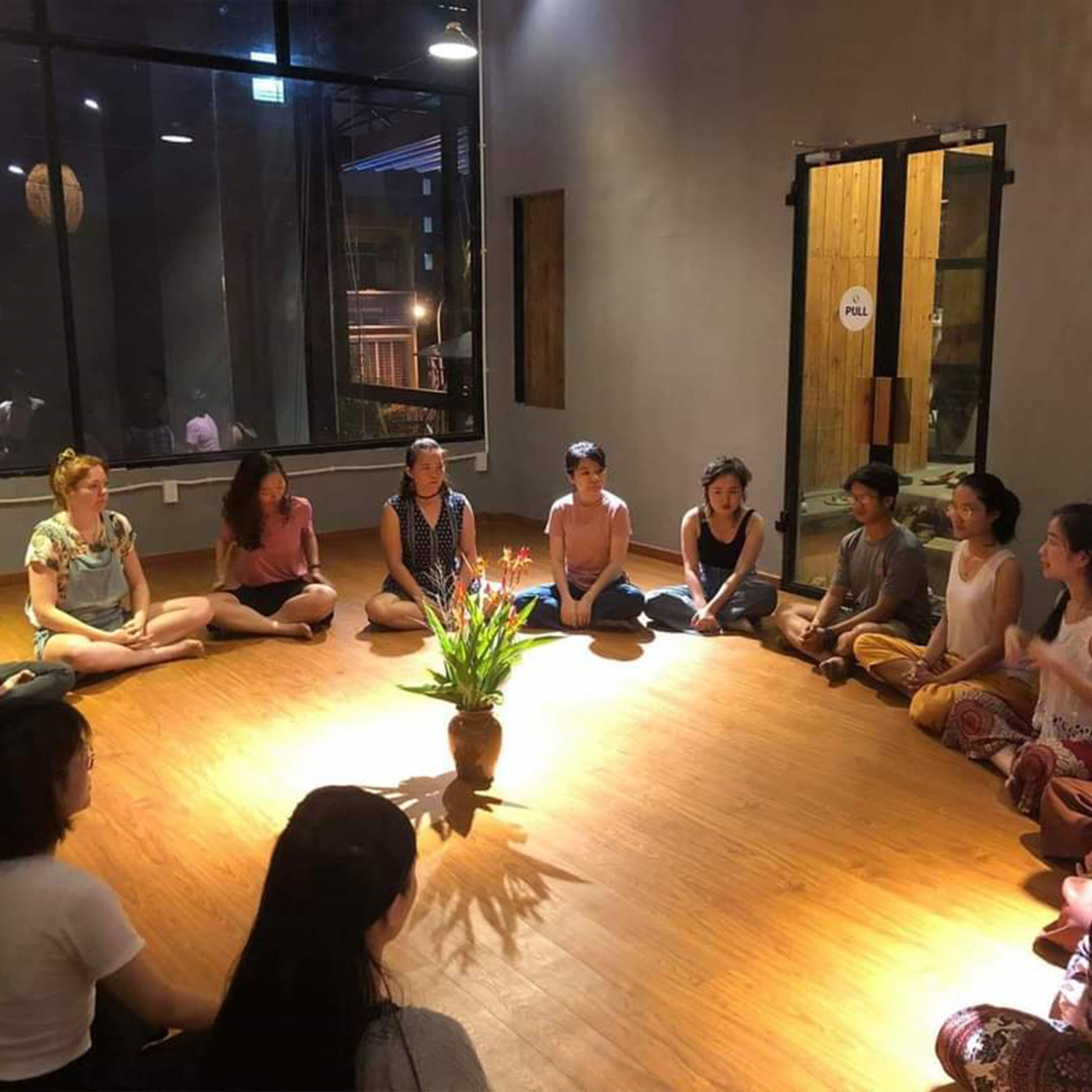
Interventions focus on self-recovery, reducing anxiety, changing young people's perceptions of things, and applying learned skills to communicate and connect with people around them, especially their family and friends.
The Journey is no longer lonely
“With the group's companionship, I gradually quit using substances, and my health improved. I also borrowed money to open a sidewalk cafe to make a living. Life is still difficult, and I am trying to make ends meet daily. But no matter how hard it is, I try to let my child go to school so he/she can receive the best things and have a brighter future.
I took my child to his/her grandmother's house. Leaving behind the stories of the past, I hope my child is connected and loved. After all, tolerance and acceptance are ways to appreciate each other more.”
I took my child to his/her grandmother's house. Leaving behind the stories of the past, I hope my child is connected and loved. After all, tolerance and acceptance are ways to appreciate each other more.”

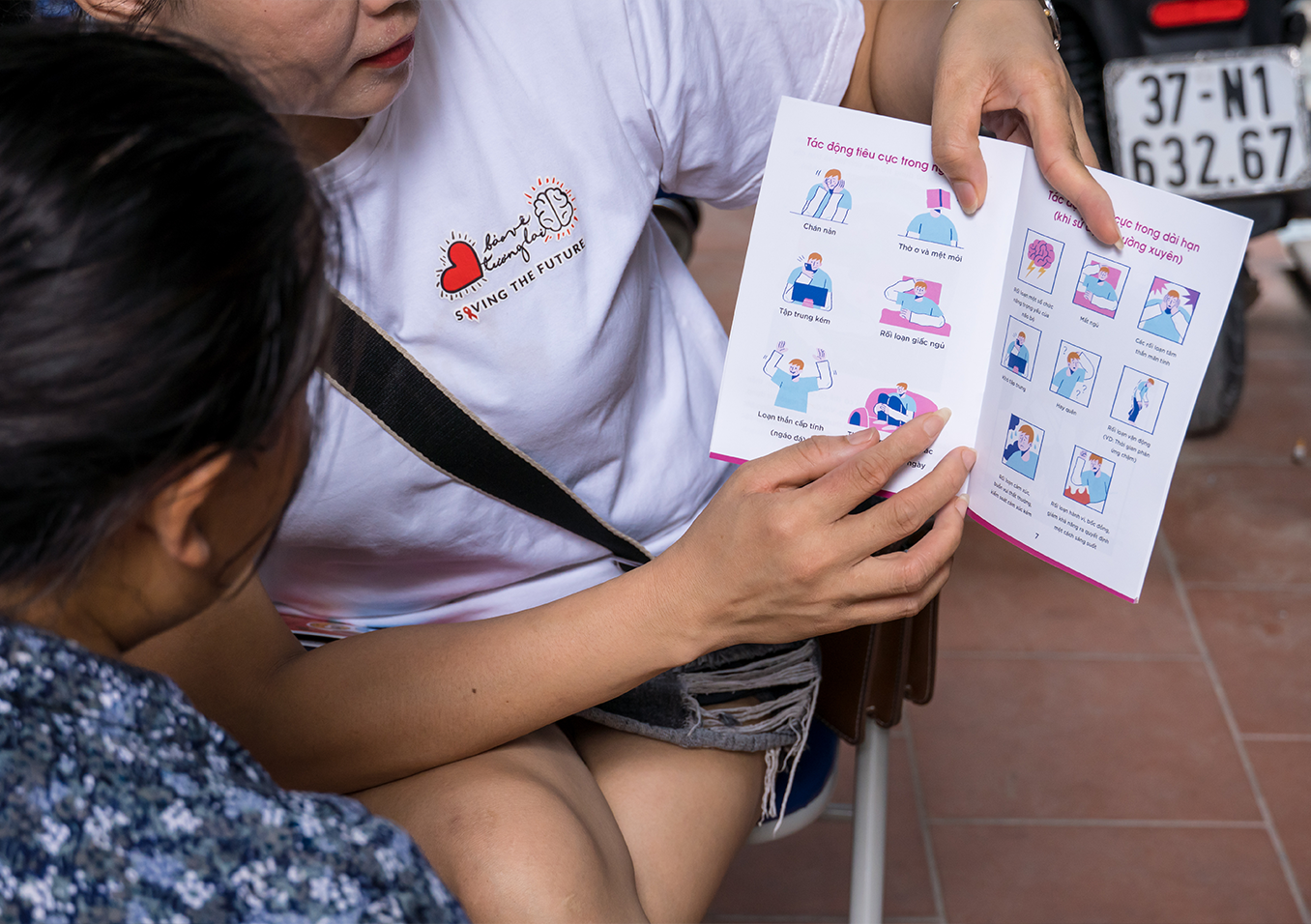

“I currently have a dream for the future, which is to open a lottery ticket booth for my family because my parents are old, and I want them to have the healthiest days possible.
Coming this far, I understand how harmful drug use is. When I meet people like me from before, I will advise them. I will share my life story with them, the harm and the impact on mental health, applying the knowledge the project has shared with me gently, patiently, and empathetically."
"I was forever impressed when I was about to give birth, and I had no money. I called the group, and they took me to the hospital to give birth. The group supported me financially and arranged accommodation for me. I remember that day vividly, and I will never forget their kindness."
"Not only have I reduced the frequency of drug use, but I have also gained knowledge to protect myself. I can engage in prevention measures. Even when I used drugs, I didn't feel as tired as before, and my sleep was more peaceful."
Coming this far, I understand how harmful drug use is. When I meet people like me from before, I will advise them. I will share my life story with them, the harm and the impact on mental health, applying the knowledge the project has shared with me gently, patiently, and empathetically."
"I was forever impressed when I was about to give birth, and I had no money. I called the group, and they took me to the hospital to give birth. The group supported me financially and arranged accommodation for me. I remember that day vividly, and I will never forget their kindness."
"Not only have I reduced the frequency of drug use, but I have also gained knowledge to protect myself. I can engage in prevention measures. Even when I used drugs, I didn't feel as tired as before, and my sleep was more peaceful."
I am trying to give up drug use completely. And I'm very sure about that because now I have a support group.
Now, I don't blame my parents anymore. I live strong for my child. Although I'm not close to my parents, I wish them good health. My motivation now is for my child only because my child grows every day, and if I keep doing bad things, people will look down on him, and they will talk about my child. I hope my child won't be like me before. I'll try my best. I'll do something better for my child to have a brighter future."
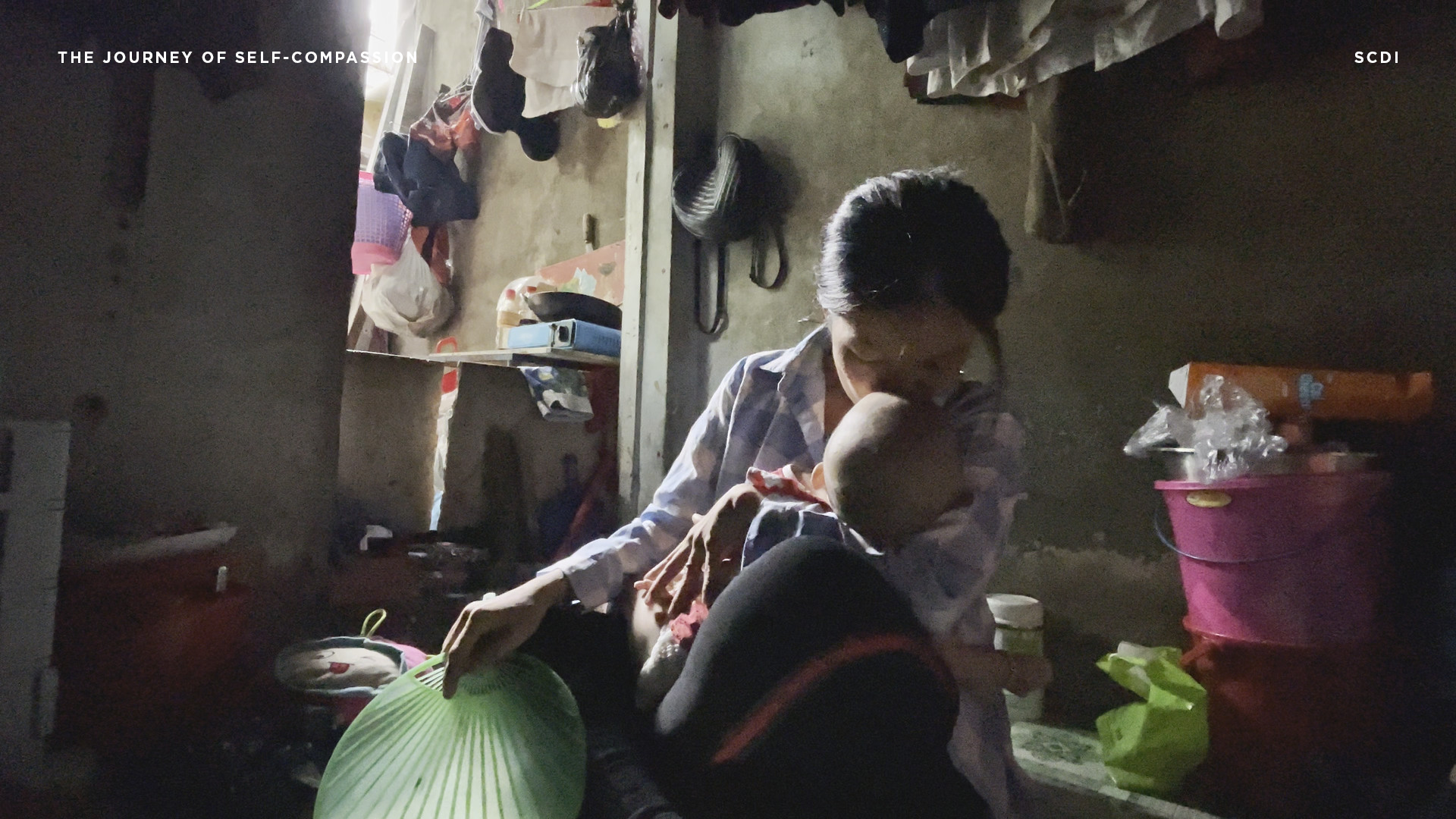
The journey of self-compassion is not easy, especially for young people who have experienced pain in the past. But with the open arms of welcome, support, and sympathy from the community, they give themselves the opportunity to connect and love themselves, and the pain will no longer persist.
*The stories of clients from Saving the Futute 2.0 project - Strengthening New Community-based Interventions to control HIV infection among young people who use drugs in Vietnam.
*The stories of clients from Saving the Futute 2.0 project - Strengthening New Community-based Interventions to control HIV infection among young people who use drugs in Vietnam.

